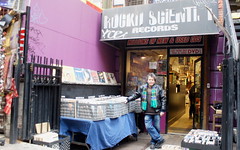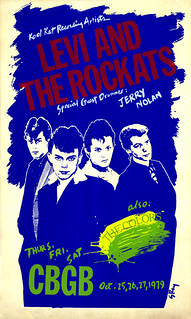Pat Ivers and Emily Armstrong continue sorting through their archives of punk-era concert footage as it’s digitized for the Downtown Collection at N.Y.U.’s Fales Library.
 Richard Hell with set list.
Richard Hell with set list.You can’t talk about punk rock without talking about Richard Hell. Television, the band he founded in 1973 with then best friend Tom Verlaine, was one of the groups – along with Blondie and the Ramones – that laid the foundation for the downtown scene at CBGBs. Sex Pistols impresario Malcolm McLaren purportedly looked at a poster of Television in 1974, pointed at Richard and said, “I want to start a band that looks like him.”
With his chopped hair and ripped-up shirt, Hell looked like nobody else. And with his kinetic, jangly stage presence and slinky bass, he sounded like nobody else. “Richard had some charisma you can’t buy in a store and apply to yourself like a cream,” recalled Television guitarist, Richard Lloyd. ”He had ‘it,’ the inimitable ‘it,’ the mysterious ‘it.’ His loopy bass lines were cartoonish in their wonderment; he was fantastic.”
Not everyone in the band agreed and Richard left to join the Heartbreakers with Johnny Thunders in 1975. But sharing stage and song time with Thunders seemed like a Television rerun for Hell: “I wanted to try something quicker, more strange than the stuff Johnny wanted,” he said. Read more…
Pat Ivers and Emily Armstrong continue sorting through their archives of punk-era concert footage as it’s digitized for the Downtown Collection at N.Y.U.’s Fales Library.
At CBGB, it was a crapshoot what you would hear on a given night (maybe folk rock, maybe noise bands) and we, the audience, said bring it on. If the music was good, we listened to it. But over in England, there was a culture war raging that was alien to most variety-loving New Yorkers.
Teds were the original “rebel teenagers” of the late 40s and early 50s, with their own unique clothing style and love of early rock and roll. They endured as a niche group for years, enjoying a resurgence in the 70s. They held on to their sartorial and musical traditions – and with it, an unfortunate penchant for violence, a behavior certainly fanned by the British tabloids. Though the gritty details remain debatable, it seemed inevitable that the conservative, volatile Teds would pick a fight with the publicity-loving, anarchic punks. The natty Teds didn’t like safety pins and they sure didn’t like the Sex Pistols.
Leee Black Childers remembered going to a rockabilly show in London in 1977 while touring with the Heartbreakers as their manager during the “Anarchy in the UK” tour. “When the lights went up, Teds suddenly descended on us and threatened to beat us up for being punks,” he said. “This kid, Levi Dexter stepped up and stuck up for us and we were saved.” Childers asked him if he had any friends, because with his looks he could start up a band. Levi recruited childhood friend Smutty Smiff and a few others and Childers became their manager. Read more…
 Suzanne Rozdeba Joe Barbosa had been selling records outside of the store.
Suzanne Rozdeba Joe Barbosa had been selling records outside of the store.Earlier today, John Kioussis hauled a turntable and a few remaining crates of records out of an empty, darkened storefront at 33 St. Marks Place. Before locking up the narrow nook that has housed Rockit Scientist Records since 2003, he said he had closed in part because of squabbles with one of his landlords.
Mr. Kioussis let forth a litany of complaints about Amnon Kehati, a co-owner of the building (which is for sale) and of Mark Burger next-door: he had set up tables in front of his store without asking, made unreasonable complaints about garbage bags being left out, and accused the record store of attracting rats.
“The reason we have rats in the building, according to the landlord, is because I have records downstairs and rats are attracted to records,” Mr. Kioussis said as he cleared out his shop. “I wonder what scientist would tell you that Bob Dylan and Sex Pistols records attract rats as opposed to bags of tomatoes and onions all over the floor.” Read more…






